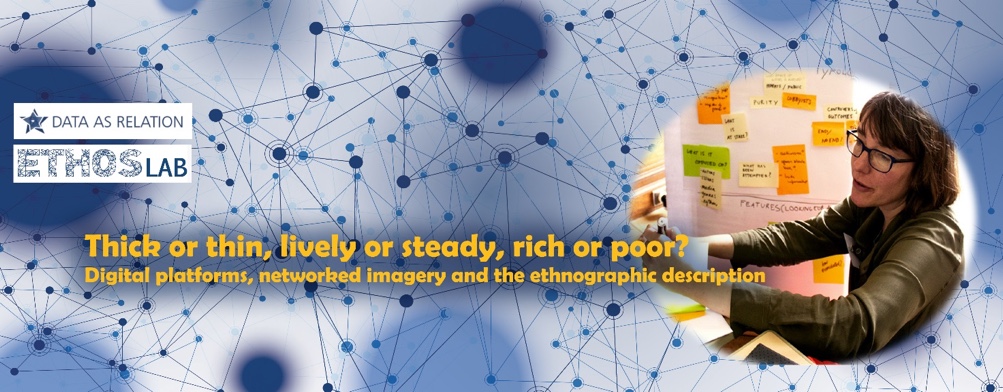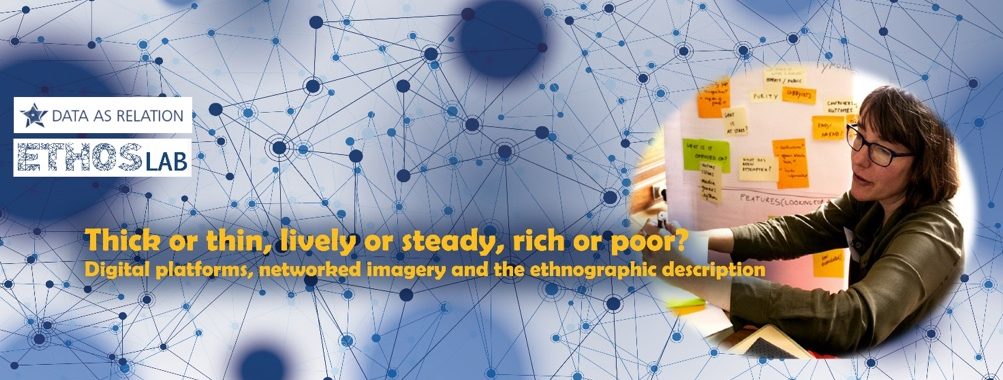
Noortje Marres guests the TiP group for a seminar. Taking a point of departure in a chapter from Noortje Marres’ most recent book “Digital Sociology” we invite the participants of this seminar to develop the notion of situated analytics. Specifically, we begin by discussing a couple of pre-circulated readings, focusing on how they help us problematize the situation described above. Participants are then asked to think together about what a more speculative take on ethnographic description, which we name ‘situated analytics’, might offer to the challenge posed by interconnectedness and online, networked imagery. The workshop is concluded by a writing session in which we experiment with a style of interpretative description that is empirical in the ethnographic sense, yet, speculative or experimental.
Noortje Marres is Associate Professor in the Centre for Interdisciplinary Methodologies at the University of Warwick. She studied Science and Technology Studies at the University of Amsterdam and the Ecole des Mines (Paris) and her main research interest is in the transformation of participation in technological societies. She has also contributed to the development of creative methodologies for social research, in particular digital methods of issue mapping. She published two books, Material Participation (Palgrave, 2012/2015) and Digital Sociology (Polity, 2017). Her current research approaches street trials involving driverless cars as experiments in participation. More info at www.noortjemarres.net
When and where
Date/time: September 21, 2017 from 12-16:00
Venue: IT University of Copenhagen, Rued Langgaards Vej 7, 2300 Copenhagen S.
The seminar is open for all, but places are limited, please register http://bit.ly/ethos-seminar.
Lunch is included in the workshop for participants. A detailed program will be circulated along with the readings prior to the seminar.
Background for the seminar
Digital platforms such as Facebook, YouTube, Twitter, LinkedIn and others are by now an integral part of social life for many and form environments for organizational world-making. Michel Callon has proposed that social scientists follow the world-building activities of actors, whose concerns they share. In this workshop, we take up the baton, firstly, by focusing on world-making activities in which the presence of digital platforms and the interactions between them are pivotal. And, secondly, by attending to our own interpretation and theory-building of world-making activities on and across digital platforms.
To offer a bit of background, we are interested in the conditions of being ‘a following science’ in a ‘platform society’ where the social is always-already digitally and algorithmically shaped. For the techno-sociologist, -anthropologist, or STS researcher the situation is becoming slightly complicated by this pre-formatting. Not only is there no social context available for analysis (we got rid of that long time ago with ANT), but there is no technical context either, as environments are multiplying. Rather than environments for the happening of the social, the environments have themselves become events in the face of ongoing, constantly transforming social and organizational realities.
Digital methods, computational social science and digital sociology have tackled the move of social life from offline to online by using some of the very infrastructures on which social life unfolds as tools for analysis (Rogers, Marres, Madsen). Some have studied online environments anthropologically using ethnographic and comparative methods (Bolstorff, Taylor). The interconnectedness of platforms and the increasing amount of online, networked images that travel across platforms pose new challenges for how we analyse and intervene in digital worlds. These developments challenge how we theorize as well as how we inquire into digital worlds.
In this workshop, we are particularly interested in how the inter-connectedness and rapid movement of materials online pose challenges to the ethnographic description of digital forms of life. Wang has taught us that big data must be supplemented by the richness of thick, qualitative data. But what might the fate of ethnography’s thick description be in situations where researchers do not have access to the sites where digital data are produced, or where decisions about data’s movements are made, and where interpretative processes are ostensibly distributed among human, technical and other non-human agents? More often than not, relevant decisions are machine-made, and the business environments are hermetically closed to social scientific observation.
It is in these situations, where direct participation is impossible and participant observation or interviews are not an option, that we need another approach. Facebook feeds, twitter conversations and YouTube streams have often been cast in terms of the opposite of thick, lively or rich data. Yet, as the social, organizational and political life forms we seek to grasp and describe ethnographically are now deeply enmeshed with platforms, how can we take them seriously as (ethnographic) materials in interpretative analysis?
